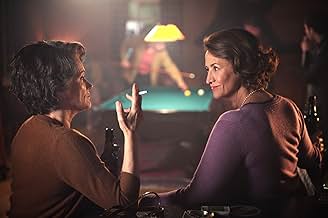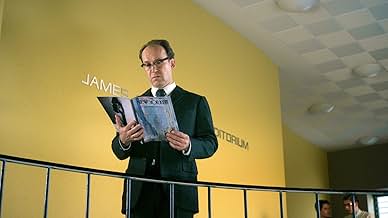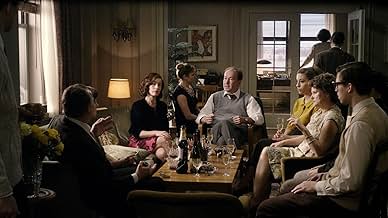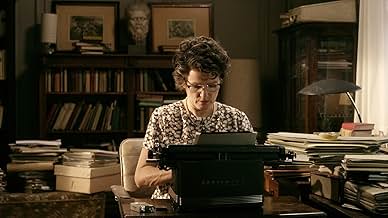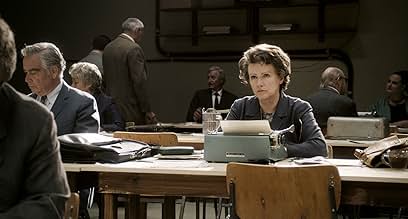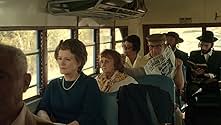AVALIAÇÃO DA IMDb
7,1/10
12 mil
SUA AVALIAÇÃO
Um olhar sobre a vida da filósofa e teórica política Hannah Arendt, que relatou para The New Yorker sobre o julgamento do líder nazi Adolf Eichmann em Jerusalém.Um olhar sobre a vida da filósofa e teórica política Hannah Arendt, que relatou para The New Yorker sobre o julgamento do líder nazi Adolf Eichmann em Jerusalém.Um olhar sobre a vida da filósofa e teórica política Hannah Arendt, que relatou para The New Yorker sobre o julgamento do líder nazi Adolf Eichmann em Jerusalém.
- Direção
- Roteiristas
- Artistas
- Prêmios
- 8 vitórias e 18 indicações no total
Leila Lallali
- Student Laureen
- (as Leila Schaus)
- Direção
- Roteiristas
- Elenco e equipe completos
- Produção, bilheteria e muito mais no IMDbPro
Avaliações em destaque
Hannah Arendt (2012) is a movie co-written and directed by the outstanding German director Margarethe von Trotta.
The film stars Barbara Sukowa as Arendt, who was one of he leading intellectual thinkers of the 20th Century. Arendt's history reads more like fiction than non-fiction. As discussed in the movie, she studied in Germany under the great philosopher Heidegger, was imprisoned in a Nazi internment camp in France, from which she escaped, came to the U.S., and taught at some of the finest universities in our country.
The movie concentrates on the furor that arose after Arendt wrote about the Eichmann trial for The New Yorker. (These articles were later published as a book.) Arendt brought forth her theory of the banality of evil in these articles. Her point was that an evil person like Eichmann was not a monster, but rather a person who has renounced his ability to think, and therefore has renounced his status as a human being.
Arendt believed that Jews who accepted a modicum of authority from the Germans contributed to the Holocaust, because without the Jewish leaders to maintain order, there would have been more chaos and less killing of Jews.
This latter belief made people furious, because it suggested that the Jews were partially responsible for their own fate. This is hard enough to hear now. You can imagine how it was received in 1961, less than 20 years after the Holocaust.
One weakness of the film is that the script suggests that "everyone" was talking about Arendt's writing. Then, as now, the intellectuals of the Upper West Side of Manhattan did not represent a true sample of the U.S. population. Many people were aware of the Eichmann trial, but Arendt's writings passed unnoticed by most people.
Another weakness is that characters in Arendt's life are introduced once, and then never again. If you miss the names the first time, you'll just have to live without knowing who was whom. That's not so bad, because you can accept Barbara Sukowa as Arendt. Everyone else in the film revolves around her.
If you're interested in the Holocaust and in 20th Century philosophy, the film is a must. Even if those topics aren't important to you, the movie is compelling as a study in human behavior and human interactions. We saw the film at the Rochester Jewish Community Center as part of terrific Rochester Jewish Film Festival. If it's available on DVD or at another festival, I recommend that you see it.
The film stars Barbara Sukowa as Arendt, who was one of he leading intellectual thinkers of the 20th Century. Arendt's history reads more like fiction than non-fiction. As discussed in the movie, she studied in Germany under the great philosopher Heidegger, was imprisoned in a Nazi internment camp in France, from which she escaped, came to the U.S., and taught at some of the finest universities in our country.
The movie concentrates on the furor that arose after Arendt wrote about the Eichmann trial for The New Yorker. (These articles were later published as a book.) Arendt brought forth her theory of the banality of evil in these articles. Her point was that an evil person like Eichmann was not a monster, but rather a person who has renounced his ability to think, and therefore has renounced his status as a human being.
Arendt believed that Jews who accepted a modicum of authority from the Germans contributed to the Holocaust, because without the Jewish leaders to maintain order, there would have been more chaos and less killing of Jews.
This latter belief made people furious, because it suggested that the Jews were partially responsible for their own fate. This is hard enough to hear now. You can imagine how it was received in 1961, less than 20 years after the Holocaust.
One weakness of the film is that the script suggests that "everyone" was talking about Arendt's writing. Then, as now, the intellectuals of the Upper West Side of Manhattan did not represent a true sample of the U.S. population. Many people were aware of the Eichmann trial, but Arendt's writings passed unnoticed by most people.
Another weakness is that characters in Arendt's life are introduced once, and then never again. If you miss the names the first time, you'll just have to live without knowing who was whom. That's not so bad, because you can accept Barbara Sukowa as Arendt. Everyone else in the film revolves around her.
If you're interested in the Holocaust and in 20th Century philosophy, the film is a must. Even if those topics aren't important to you, the movie is compelling as a study in human behavior and human interactions. We saw the film at the Rochester Jewish Community Center as part of terrific Rochester Jewish Film Festival. If it's available on DVD or at another festival, I recommend that you see it.
Although I was not familiar with the name "Hannah Arendt," I was certainly familiar with the phrase "banality of evil" that Arendt coined. However, "banality of evil" is not the phrase she used. The full phrase is "the fearsome, word-and-thought-denying banality of evil." Because, unlike the claims of many accusers who didn't fully understand her, Arendt didn't see a simple bureaucrat in Eichmann during his 1960 trial in Israel. She saw a truly evil man who "spoke like a bureaucrat." Her point being that Eichmann did not speak or seem to think like a genocidal maniac yet he acted like one nevertheless. That is evil cloaked in the banal. This movie revolves around the years of Arendt's life, 1960 to 1963, when she was formulating these ideas and in that, I think the movie probably has it right.
All that said, and these are certainly ideas worth mulling over, this is a film for ideas and for philosophy buffs, not for film buffs. Why do I say this? Because this movie is slow, at least for American audiences. The beginning is confusing. We see a woman in New York but we don't know the date. She speaks German. We see a man get off of a bus heading to "Victoria" in the middle of nowhere. He is promptly kidnapped. We don't know when or where. Eventually, we learn the kidnapped man is Adolph Eichmann who is nabbed by the Mossad in Argentina in 1960. Much of the movie unfolds slowly. This is a film about thinking. It is not about doing much or feeling much. It is an intellectual film.
There's one semi-action scene in the film where a 1950s vehicle corners Arendt on the road where she is walking. Israeli secret agents pour out of the car and threaten Arendt, trying to prevent her from publishing her book about Eichmann. Based on someone knowledgeable, Professor Roger Berkowitz, academic director of the Hannah Arendt Center for Politics and the Humanities at Bard College in New York, it appears this scene was invented out of whole cloth to try to give the film at least some suspense. But that's not what this film is about.
It's about thinking and it's about the fearsome, word-and-thought-denying banality of evil and how Hannah Arendt was the first to identify this 20th-century pathology of the human psyche.
Thanks to the Camera Cinema Club in San Jose for showing this film.
All that said, and these are certainly ideas worth mulling over, this is a film for ideas and for philosophy buffs, not for film buffs. Why do I say this? Because this movie is slow, at least for American audiences. The beginning is confusing. We see a woman in New York but we don't know the date. She speaks German. We see a man get off of a bus heading to "Victoria" in the middle of nowhere. He is promptly kidnapped. We don't know when or where. Eventually, we learn the kidnapped man is Adolph Eichmann who is nabbed by the Mossad in Argentina in 1960. Much of the movie unfolds slowly. This is a film about thinking. It is not about doing much or feeling much. It is an intellectual film.
There's one semi-action scene in the film where a 1950s vehicle corners Arendt on the road where she is walking. Israeli secret agents pour out of the car and threaten Arendt, trying to prevent her from publishing her book about Eichmann. Based on someone knowledgeable, Professor Roger Berkowitz, academic director of the Hannah Arendt Center for Politics and the Humanities at Bard College in New York, it appears this scene was invented out of whole cloth to try to give the film at least some suspense. But that's not what this film is about.
It's about thinking and it's about the fearsome, word-and-thought-denying banality of evil and how Hannah Arendt was the first to identify this 20th-century pathology of the human psyche.
Thanks to the Camera Cinema Club in San Jose for showing this film.
Margarethe von Trotta's Hannah Arendt is a film about thinking. Moreover, it's in favour of it. It so values thinking that it offers some elegant speeches and debate, sans computer generated spectaculars.
Barbara Sukowa portrays the German Jewish philosopher during the period she covered the Adolf Eichmann trial in Israel for The New Yorker. The film confronts the controversy Arendt raised when (i) she redefined Eichmann not as a monster but as an ordinary nobody, exemplifying "the banality of evil," (ii) she reported that some Jews collaborated with the Nazis, resulting in more deaths than chaos would have caused, and (iii) she said she loves her friends but not any "people," in this case, the Jews. On all three counts she was condemned for abandoning her people. Today, at a remove from the heat of that moment, she was clearly correct on all counts. For more see www.yacowar.blogspot.com.
Not loving the Jews was not being anti-Semitic but refusing to emotionalize her consideration of the issues. Arendt was opposed to the blanket love of any group of people, not based on personal engagement, because such nationalist or other group identification precluded the thoughtful consideration of any issues around them. She most valued a rational, thoughtful approach that was not prejudged or proscribed by any -ism or convention. As for some Jews' collaboration, she simply reported facts that arose at the trial. (Indeed, Rudolf van den Berg's new film Suskind details precisely that collaboration.) Nor was that observation anti-Semitic, for the possibly well-intentioned collaboration in the face of horrid danger is a plausible response among any people. Arendt was pilloried for facing the facts and for rejecting myths. That's what historians are required to do and apparently what philosophers periodically have to remind them to do.
Barbara Sukowa portrays the German Jewish philosopher during the period she covered the Adolf Eichmann trial in Israel for The New Yorker. The film confronts the controversy Arendt raised when (i) she redefined Eichmann not as a monster but as an ordinary nobody, exemplifying "the banality of evil," (ii) she reported that some Jews collaborated with the Nazis, resulting in more deaths than chaos would have caused, and (iii) she said she loves her friends but not any "people," in this case, the Jews. On all three counts she was condemned for abandoning her people. Today, at a remove from the heat of that moment, she was clearly correct on all counts. For more see www.yacowar.blogspot.com.
Not loving the Jews was not being anti-Semitic but refusing to emotionalize her consideration of the issues. Arendt was opposed to the blanket love of any group of people, not based on personal engagement, because such nationalist or other group identification precluded the thoughtful consideration of any issues around them. She most valued a rational, thoughtful approach that was not prejudged or proscribed by any -ism or convention. As for some Jews' collaboration, she simply reported facts that arose at the trial. (Indeed, Rudolf van den Berg's new film Suskind details precisely that collaboration.) Nor was that observation anti-Semitic, for the possibly well-intentioned collaboration in the face of horrid danger is a plausible response among any people. Arendt was pilloried for facing the facts and for rejecting myths. That's what historians are required to do and apparently what philosophers periodically have to remind them to do.
This is a fascinating look at Hanna Arendt, a German-American philosopher who in 1961 reported on the trial of Adolf Eichmann for the New Yorker. A huge controversy erupted.
Arendt left Germany in 1933 for France, but when Germany invaded France, she found herself in a detention camp. When the film begins, she is a happily married woman with friends such as the writer Mary McCarthy, and she is a professor at, among other places, the New School in New York City.
Hanna is very excited about covering the trial, but her husband, Heinrich, is afraid it will take her back to those dark days.
While observing Eichmann, Arendt is struck by the fact that he was an ordinary man with nothing special about him. This causes her to think about the nature of evil itself.
She decides that he's not a monster but a person who suppressed his conscience in order to be obedient to the Nazis. She thus created the concept of the "banality of evil."
She believed also that some Jewish leaders at the time had fallen into this trap and unwittingly participated in the Holocaust. Her critics failed to understand her meaning.
In some camps, her New Yorker articles were not well received, as she was seen as a heartless turncoat who blamed the victims. Hanna has to defend her ideas, and the price she pays for them is high.
Barbara Sukowa does a magnificent job as Arendt, showing the woman's brilliance, courage, affection for friends and family, and hurt when some people she loved turned against her.
It's surprising that she was met with as much disdain as she was -- but Arendt did not believe in blind adoration of any group. She took people on an individual basis.
As far as the banality of evil, evil has always had the ordinary face of people sitting back and doing what they're told. Or, as Martin Luther King said, doing nothing.
I'm sure many of us have experienced this in the workplace -- I know I did. It's then that you realize the true nature of most people. Everyone can say they have ethics - but do they have ethnics when they stand to lose something?
Beautifully directed by Margarethe von Trotta, who also co-wrote the screenplay. A difficult subject made clear, a complicated woman understandable -- no small feat. A thought-provoking film.
Arendt left Germany in 1933 for France, but when Germany invaded France, she found herself in a detention camp. When the film begins, she is a happily married woman with friends such as the writer Mary McCarthy, and she is a professor at, among other places, the New School in New York City.
Hanna is very excited about covering the trial, but her husband, Heinrich, is afraid it will take her back to those dark days.
While observing Eichmann, Arendt is struck by the fact that he was an ordinary man with nothing special about him. This causes her to think about the nature of evil itself.
She decides that he's not a monster but a person who suppressed his conscience in order to be obedient to the Nazis. She thus created the concept of the "banality of evil."
She believed also that some Jewish leaders at the time had fallen into this trap and unwittingly participated in the Holocaust. Her critics failed to understand her meaning.
In some camps, her New Yorker articles were not well received, as she was seen as a heartless turncoat who blamed the victims. Hanna has to defend her ideas, and the price she pays for them is high.
Barbara Sukowa does a magnificent job as Arendt, showing the woman's brilliance, courage, affection for friends and family, and hurt when some people she loved turned against her.
It's surprising that she was met with as much disdain as she was -- but Arendt did not believe in blind adoration of any group. She took people on an individual basis.
As far as the banality of evil, evil has always had the ordinary face of people sitting back and doing what they're told. Or, as Martin Luther King said, doing nothing.
I'm sure many of us have experienced this in the workplace -- I know I did. It's then that you realize the true nature of most people. Everyone can say they have ethics - but do they have ethnics when they stand to lose something?
Beautifully directed by Margarethe von Trotta, who also co-wrote the screenplay. A difficult subject made clear, a complicated woman understandable -- no small feat. A thought-provoking film.
Other reviewers have questioned the historical accuracy of Margarethe von Trotta's portrayal of Hannah Arendt (Barbara Sukowa) and her opinion of the Jewish leaders as expressed in her NEW YORKER articles on the trial of Adolf Eichmann in 1961.
As a piece of film-making, however, HANNAH ARENDT grabs the attention and does not let go throughout its 113-minute running- time. As portrayed by Sukowa, Arendt comes across as a forthright person, not frightened of expressing her opinions and responding to any intellectual challenges from close friends such as Kurt Blumenfeld (Michael Degen). Yet beneath that tough surface lurks a profoundly disillusioned person, as she discovers to her cost that her great teacher and mentor Martin Heidegger (Klaus Pohl) does not practice what he preaches. Although insistent on reinforcing the distinction between "reason" and "passion," Heidegger takes the "passionate" decision to associate himself with the Nazi party, and thereby embraces their totalitarian values. Like Eichmnann himself, he chooses not to "think" but to commit himself to an ideology that actively discourages individual thought.
The sense of shock and disillusion Arendt experiences inevitably colors her view of the Eichmann trial. Director von Trotta includes several close-ups of her sitting in the press-room listening to the testimony of Eichmann, his accusers and the witnesses, a quizzical expression on her face, as if she cannot quite make sense of what she hears. She cannot condemn Eichmann, because he has simply followed Heidegger's course of action.
Once the articles have been published, Arendt experiences an almost unprecedented campaign of vilification. Although she is given a climactic scene where she defends herself in front of her students (and her accusers within the university faculty), we get the sense that she is only doing so on the basis of abstractions; her personal feelings are somehow disengaged. She is far more affected when her one-time close friend Hans Jonas (Ulrich Noethen) vows never to talk to her again on account of her views. Philosophers might be able to make sense of the world, but they often neglect human relations.
Consequently our view of Arendt, as portrayed in this film, is profoundly ambivalent. While empathizing with her views about the banality of evil, which reduces people to automata as they claim they were only carrying out orders, even while being involved in atrocities, Arendt herself comes across as rather myopic, so preoccupied with her ideas that she has little or no clue about how they might affect those closest to her. It's a wonder, therefore, that Mary McCarthy (Janet McTeer) chooses to stick with her through the worst of circumstances.
Ingeniously combining archive footage of the Eichmann trial with color re-enactments of what happened during that period, HANNAH ARENDT is a thought-provoking piece, even if we find it difficult to identify with the central character.
As a piece of film-making, however, HANNAH ARENDT grabs the attention and does not let go throughout its 113-minute running- time. As portrayed by Sukowa, Arendt comes across as a forthright person, not frightened of expressing her opinions and responding to any intellectual challenges from close friends such as Kurt Blumenfeld (Michael Degen). Yet beneath that tough surface lurks a profoundly disillusioned person, as she discovers to her cost that her great teacher and mentor Martin Heidegger (Klaus Pohl) does not practice what he preaches. Although insistent on reinforcing the distinction between "reason" and "passion," Heidegger takes the "passionate" decision to associate himself with the Nazi party, and thereby embraces their totalitarian values. Like Eichmnann himself, he chooses not to "think" but to commit himself to an ideology that actively discourages individual thought.
The sense of shock and disillusion Arendt experiences inevitably colors her view of the Eichmann trial. Director von Trotta includes several close-ups of her sitting in the press-room listening to the testimony of Eichmann, his accusers and the witnesses, a quizzical expression on her face, as if she cannot quite make sense of what she hears. She cannot condemn Eichmann, because he has simply followed Heidegger's course of action.
Once the articles have been published, Arendt experiences an almost unprecedented campaign of vilification. Although she is given a climactic scene where she defends herself in front of her students (and her accusers within the university faculty), we get the sense that she is only doing so on the basis of abstractions; her personal feelings are somehow disengaged. She is far more affected when her one-time close friend Hans Jonas (Ulrich Noethen) vows never to talk to her again on account of her views. Philosophers might be able to make sense of the world, but they often neglect human relations.
Consequently our view of Arendt, as portrayed in this film, is profoundly ambivalent. While empathizing with her views about the banality of evil, which reduces people to automata as they claim they were only carrying out orders, even while being involved in atrocities, Arendt herself comes across as rather myopic, so preoccupied with her ideas that she has little or no clue about how they might affect those closest to her. It's a wonder, therefore, that Mary McCarthy (Janet McTeer) chooses to stick with her through the worst of circumstances.
Ingeniously combining archive footage of the Eichmann trial with color re-enactments of what happened during that period, HANNAH ARENDT is a thought-provoking piece, even if we find it difficult to identify with the central character.
Você sabia?
- CuriosidadesFor a deeper understanding of this story, one might care to watch Operação Final (2018), which depicts the undercover mission to find and extract Adolf Eichmann from Argentina and bring him to trial in Israel. Showing the background of an operation sanctioned by PM David Ben-Gurion, the film gives a glimpse of the complexity of Eichman's character, his futile attempts to justify his actions and tell his side of the story.
- Erros de gravaçãoWhen Arendt stands on the terrace of her hotel in Jerusalem at looks across the Valley of Hinnom at the Old City, there are Israel flags flying from the Tower of David complex. However, the Old City of Jerusalem was still under Jordanian control in 1961.
- Citações
Hannah Arendt: You describe a book I never wrote.
Siegfried Moses: A book that will never be allowed in Israel. And won't appear anywhere else either if you have any decency left.
Hannah Arendt: You ban books, and lecture me about decency!
- ConexõesFeatured in Kino Kino: Hannah Arendt (2013)
Principais escolhas
Faça login para avaliar e ver a lista de recomendações personalizadas
- How long is Hannah Arendt?Fornecido pela Alexa
Detalhes
- Data de lançamento
- Países de origem
- Central de atendimento oficial
- Idiomas
- Também conhecido como
- Hannah Arendt
- Locações de filme
- Empresas de produção
- Consulte mais créditos da empresa na IMDbPro
Bilheteria
- Faturamento bruto nos EUA e Canadá
- US$ 717.205
- Fim de semana de estreia nos EUA e Canadá
- US$ 31.270
- 2 de jun. de 2013
- Faturamento bruto mundial
- US$ 8.880.936
- Tempo de duração
- 1 h 53 min(113 min)
- Cor
- Mixagem de som
- Proporção
- 2.35 : 1
Contribua para esta página
Sugerir uma alteração ou adicionar conteúdo ausente





